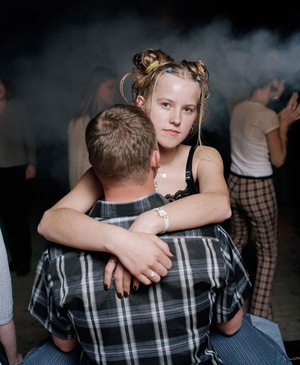Andrew Miksys: focus on the fringe 3
In brief: A. Miksys' photography series Disco shows how the person living in the United States is forced to open up to the Other because of his interest in his roots and search for his own origins; that Other is a country and people, the actual existence of which and the precise otherness the author may have thought about previously, but has never felt it in a sensory way. A. Miksys' photographs point to the cracks in the US reality, which are filled with a new content by the former Soviet colony.
The photographer of Lithuanian origin Andrew Miksys who grew up in the United States, in the city of Seattle, and who spends a lot of time in Vilnius came to his ancestral country when he had the idea to capture the hitherto ongoing discos in the Lithuanian villages. The format of which (music, behavior of the audience, interiors and other) did not change since the 70s and 80s. The series of photographs titled Disco caused many debates in Lithuania concerning the ethics of the artist and creative photography process.
By photographing what remained the same for several decades, A. Miksys returns the "lost" time for the westerners, because the viewer can see the reality, which was unreachable to him in the early days of the discos. In the post-Soviet, post-colonial space A. Miksys’ camera works as something that appropriates reality: all that is photographed becomes familiar and close to the photographer himself.
A place that once seemed to be forgotten by everyone, except its own people, suddenly appears in a globalized world and begins to affect it. The Lithuanian village captured in A. Miksys' photographs also experiences changes due to the artist's visits and activities: people become interested in things that are beyond their domestic and rural horizon; they understand that their reality is not the only possible one and become more open.
Being here, A. Miksys also experiences an inner transformation, because having grown up in the open and free world that does not give prominence to the place of birth, he uses the concept of space, instead of place. When in Lithuania he finds himself somewhere, where he has never been before - the cultural baggage he has brought with him is not so significant in here, it is only important to the extent that it allows you to capture the moments of time and the specifics of location.

